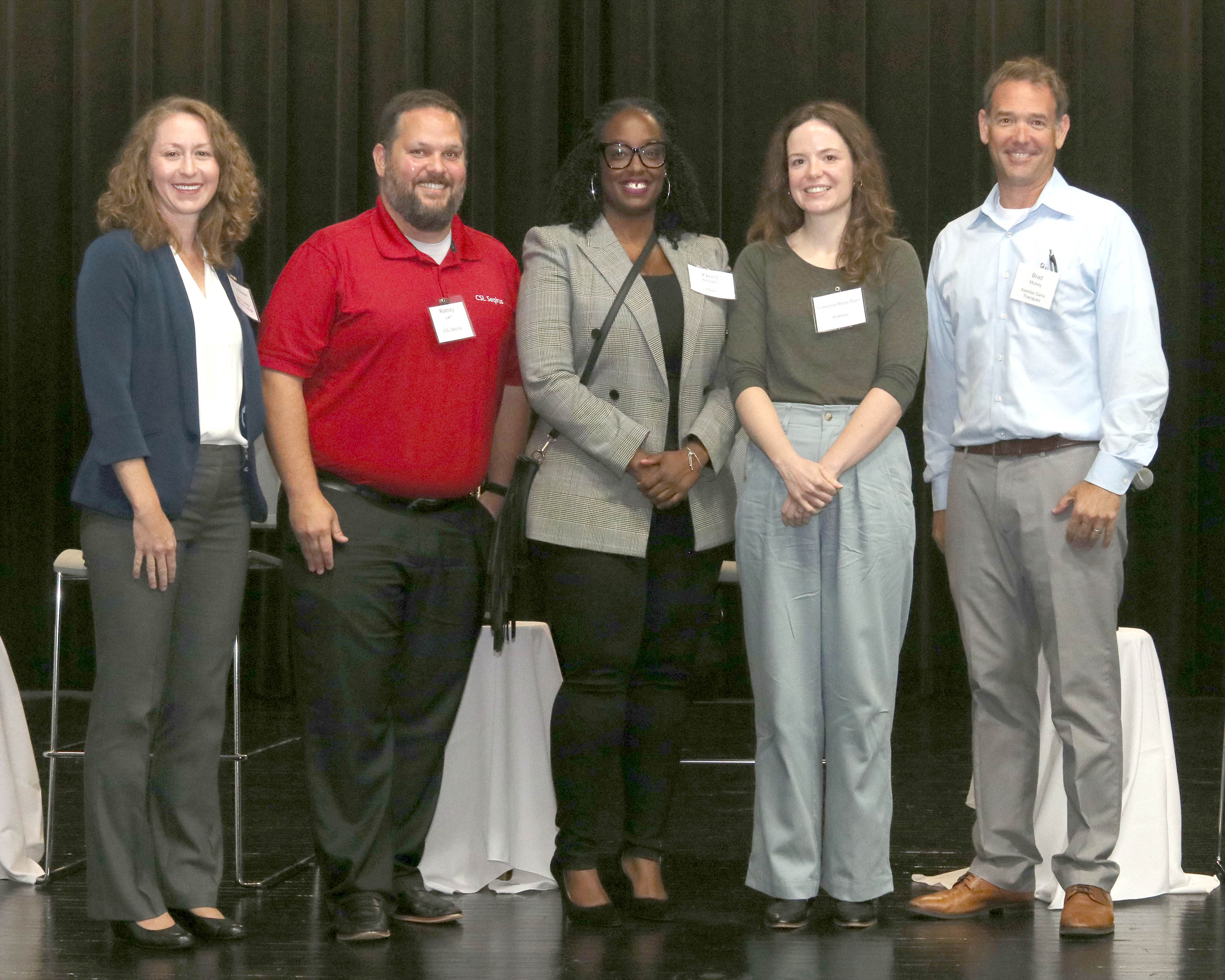College News
CCCC hosts Biotechnology networking session

click image to enlarge ⊗
Dr. Lisa Smelser (left), Central Carolina Community College Biotechnology Department Chair, visits ... (more)
08.07.2023 • College & Community • College General • Curriculum Programs
SANFORD, N.C. -- An upcoming generation of professionals creating life-improving therapies got some valuable insider's advice and made personal contacts in the industry recently thanks to the first-ever Biotechnology networking session at Central Carolina Community College.
The idea actually began with industry. Dr. Lisa Smelser, who leads the college program in Biotechnology and helped organize the session, said an advisory board heavily involved in shaping the industry-based curriculum asked for the opportunity to continue building a vibrant community around the biotechnology workforce.
"The biopharmaceutical companies want to be here and the college is here to support what they need to train a right-skilled workforce," she said. "This is all about networking -- about bringing together our students who work in the industry, recently graduates looking to be a part of industry, students wanting to enter the industry and looking at how those folks can grow in their careers."
Most of the evening focused on a panel discussion led by Brad Mickey, executive director of manufacturing for Astellas Gene Therapies, that emphasized how important it can be to find mentors in the professional environment.
Mickey began by posing a question about the role of mentors to three successful professionals already working at area vaccine and pharmaceutical companies: Ebony Arrington from Pfizer, Cameron Rose Dyer from Astellas Gene Therapies and Rodney Lam from CSL Seqirus. Each had a different path into the business and each had different perspective to share.
But common themes still emerged. The group discussed the importance of building trust in the work environment, being "intentional" in finding mentors and tapping into their expertise, and having a two-way relationship where both people can learn from the other.
One point that got animated discussion was making sure that younger professionals were open to the guidance they were receiving, even when it is delivered in a more candid style.
Lam described a valued mentor who came from a more direct culture and gave blunt advice. He recalled one conversation where the two were discussing Lam's goals a few years down the road and what he was doing to prepare.
"She just stopped me and said, 'You're not doing enough. If that's where you really want to be, you are not doing enough,'" he said. "And then she listed off six things that I needed to start doing.
"I came into that thinking, here's all the stuff I've done. And I've prepared; I've listed it all out. I was proud of myself. And then she smacked me down."
But Lam said he learned a lot from that encounter and it changed the way he went about work and developing his career.
It wasn't just Lam. When the mic was passed to Arrington at the other end of the row, she added: "You actually triggered a thought through my head, a 'smack-me-down' moment for me as well that probably was a pretty pivotal moment from a mentor."
And then Arrington went on to talk about why it's so important to accept that kind of candid advice -- and why building a trusted relationship up front makes it easier to hear. "You can imagine how that would go if you're connected with somebody as a mentor and they tell you, 'You're good, but you're not that good.'"
Before the panel walked onstage in the Dennis A. Wicker Civic & Conference Center Auditorium, about 60 participants mingled in the foyer for the better part of an hour in an informal session bringing students together with local professionals, companies and college officials -- all designed to build that sense of community.
While some were gathering insight at large, round tables over a light dinner, others were asking about employment opportunities or passing contact information back and forth on phones.
This kind of interaction is what Smelser hoped for when she and her colleagues took industry advice and sat down to develop the evening's activities. And now, she says, they hope it will become an annual event.
To learn more about the CCCC Bioprocess Technology program, visit www.cccc.edu/bioprocess.
Categories
- Admin, Faculty & Staff Category
- Arts & Entertainment Category
- Clubs Category
- College & Community Category
- College General Category
- Continuing Education Category
- Curriculum Programs Category
- Distance Education Programs Category
- Facilities/Buildings Category
- Finances Category
- Foundation Category
- Graduations Category
- Lee Early College Category
- NCCCS Category
- SGA Category
- Special Events Category
- Sports Category
- Students/Graduates Category
- Uncategorized Category
Archives

